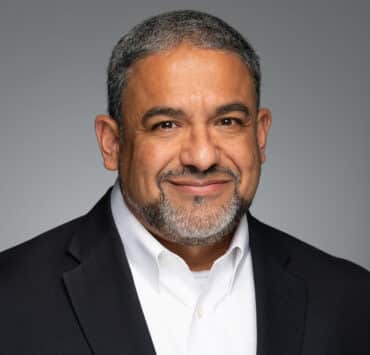|
Getting your Trinity Audio player ready...
|
One of the things Eduardo Muniz might have in common with other HR leaders is that he didn’t grow up wanting to be in the field. The vice president of people technology and operations at artificial intelligence (AI) lending marketplace Upstart had gravitated toward business and finance roles in his early career days. But his HR journey has been filled with unique opportunities to shape culture and to develop the future of work.
The first one came in an email from a Google recruiter.
“They wanted me to interview for a people operations position supporting Latin America,” he recalls. “At first, I thought it was a phishing email. Was this a mistake? I didn’t know a single thing about HR, and I had actually applied for a finance role. But, when Google comes knocking on your door, you answer it.”
He went on to spend nearly a decade at the tech giant, gleaning lessons from its data-driven way of designing people programs and helping to solve HR challenges during the COVID-19 pandemic in ways that companies later attempted to follow.
“The better we get at these capabilities now, the more effective we will be when we begin scaling at a rapid pace again.”
Eduardo Muniz
In 2021, Muniz had the opportunity to leverage what he learned to push the ball forward at Upstart. The company connects millions of consumers to banks and credit unions that leverage its AI models and cloud applications to deliver credit products, such as personal and auto loans and home equity lines of credit.
As someone who grew up in Brazil, a country that grapples with inequality, Muniz was drawn to Upstart’s mission, its digital-first approach to serving clients, and the opportunity to help the company scale.
“The beauty of our technology is that we don’t just look at someone’s credit score to determine the terms of their loan. In fact, that’s just one of the more than 1,500 variables our models take into account,” explains Muniz. “The result is that lenders can approve more borrowers at lower APRs [annual percentage rates] across races, ages, and genders, and in a much more seamless digital experience, without all of the bureaucracy and paperwork you’d find traditionally.”
Today, he’s supporting that by building the technology and process infrastructure to attract, engage, retain, and develop talent for Upstart. The process involved recently completing the company’s migration from the commonly used full-service HR solutions offered through professional employer organizations to Workday, and creating lighter and shorter evaluation cycles that allow for performance conversations to happen throughout the year, without the formality of ratings and the company’s annual review process.
To Muniz, these efforts will prepare Upstart for more growth next year.
“Without the right data and technology, we don’t have a window into our company life and culture, can’t build the right programs, and are not able to remove any potential disconnects between Upstarters and our leadership. The better we get at these capabilities now, the more effective we will be when we begin scaling at a rapid pace again,” he says. “Needless to say, I couldn’t think of a more opportune moment to do that.”
“You need to be principled in your approach, and make sure that AI doesn’t become the actual HR strategy, but a tool to help you achieve it.”
Eduardo Muniz
Much of the world has shifted to a back-to-the-office mindset, but Muniz notes that Upstart’s 90 percent job offer approval is proof that its digital-first model is working. Most employees can live and work anywhere in the US, while in-person gatherings are used intentionally to foster collaboration and connection. By taking this approach, the organization is able to access a greater talent pool by not being restricted only to people who live near its headquarters in San Mateo, California, and Columbus, Ohio.
“I believe we found the right mix between the productivity and engagement we get from working from the comfort of our homes, and the connection and team bonding when we come together in our offices once a month or every couple of months, depending on the team,” he notes.
Muniz also can’t think of a more exciting time for HR and technology professionals. But he admits that even for a digital-first company, it can be hard to keep track of all the technology advancements in his field. He receives multiple emails a day from companies pitching AI solutions for automating HR processes, using chatbots that answer HR questions, drafting employee handbooks, and streamlining candidate outreach. He tries to parse through them by narrowing the search to solutions that tie to the company’s strategic initiatives.
“Since we’re uplevelling our talent tools, we’re exploring how AI can help us predict which candidates will make the best hires or help highlight problem areas in the organization that might impact employee engagement, productivity, and potentially attrition,” he explains. “So, using things like sentiment analysis in employee surveys to go beyond what the typical numerical scores are telling you.”
To maximize AI investments, he advises leaders to “build a connected digital people strategy to integrate disparate systems and data sources.”
“In other words, have a solid baseline of systems and programs with reliable data before you start layering various external point solutions and building loads of integrations, automation, and chatbots,” Muniz says. “You need to be principled in your approach, and make sure that AI doesn’t become the actual HR strategy, but a tool to help you achieve it. You need to fix the plumbing first and not the wallpaper.”
At The Larkin Company (third-party leave and disability management company), our professionals customize services to each client’s unique needs, delivering our real differentiation—truly personal service. With Larkin, companies are empowered to deliver a trusted human connection, a superior level of care, and presence in the moments that matter. Eduardo Muniz’s team at Upstart partnered with Larkin in early 2022 to provide one-to-one service to Upstart employees where a single point of contact guides employees through the entire leave and disability process. Larkin is proud to partner with Upstart to deliver the best, possible employee experience, while improving HR productivity.

